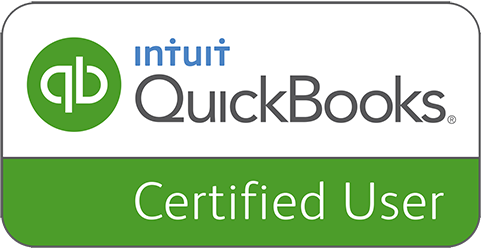
Learn Bookkeeping with QuickBooks Online

Across industries, one thing is true, the need for skilled and qualified bookkeepers to keep businesses' finances in order. From recording income and expenses to entering checks and bank transfers to setting up a chart of accounts—performing these bookkeeping duties successfully in QuickBooks Online is essential for any company.
This 100% online course will teach you how to proficiently use basic, intermediate, and advanced features of QuickBooks Online while applying basic accounting principles and concepts. Once you complete this course, you will understand how to get a company's finances in order and be prepared for the QuickBooks Certified User (QBCU) Exam.
Job Outlook for Bookkeepers
- According to Payscale.com, the average salary per year for bookkeepers is $45,750, with top earners making over $60,000.
- According to the U.S. Bureau of Labor Statistics (BLS), over 170,000 new jobs are projected for bookkeeping, accounting, and auditing clerks annually, on average, by 2030.
- According to CareerBuilder.com, bookkeeping is a highly transferable skill set for accounting professionals who want to advance into financial analysis or management roles.
- Mastering QuickBooks Online is the key to matching bookkeeping skills with expanding technology requirements for analysis, visual data presentation, and reporting that provides value-added to the traditional bookkeeper's duties.
Bookkeeping FAQs
WHAT DOES THE BOOKKEEPER ROLE INVOLVE?
Bookkeepers serve on the front lines of a person, company, or organization's financial health. Strong bookkeepers set up, deploy and manage systems that record the flow of funds into and out of an entity's coffers. Bookkeepers use reporting tools and systems to help individuals and operational managers stay aware of and improve an entity's financial status and performance.
WHY DO BOOKKEEPERS NEED QUICKBOOKS?
QuickBooks has replaced the manual entry functions of traditional bookkeeping. However, the organization, reporting, and use of financial data still rely heavily on human input and processing. Knowing how to automate your bookkeeping practice with QuickBooks is important to stay competitive in today’s job market.
DO COMPANIES WANT BOOKKEEPERS WHO ALREADY KNOW QUICKBOOKS?
Yes, if you are an expert in the latest version of QuickBooks, you should be able to help any small business immediately organize its finances. Since QuickBooks is the top-rated accounting software for small businesses, you likely know a company that already uses it.
Course Objectives and Benefits
- Prepare to sit for the QBCU Exam.
- Successfully set up a company file in QuickBooks Online.
- Perform fundamental analysis of accounts, financial documents, and reports.
- Perform essential bookkeeping duties and tasks.
- Apply basic accounting principles (accrual method, depreciation, etc.) to bookkeeping practices.
- Understand fundamental accounting concepts and how QuickBooks works to support these concepts.
- Externship starter kit opportunity (not guaranteed, speak with an enrollment rep about qualifications).
- Learn and use key features of QuickBooks Online proficiently.
Prerequisites
There are no prerequisites to take this course.
Curriculum
- Introduction to Bookkeeping
- Accounting Basics
- Getting Started with QuickBooks Online
- The Chart of Accounts
- Centers and Lists
- Bank Accounts
- Recording Expenses and Paying Bills
- Credit Cards and Loans
- Sales Receipts
- Invoices, Estimates, and Customizing Sales Forms
- Billable Expenses and Customer Credits
- Sales Taxes and Reports
- MIDTERM
- Product and Service Items
- Managing Inventory
- Managing Projects and Sales
- Progress Invoicing, Late Fees, and Bad Debts
- Payroll
- Fixed Assets and Loans
- Business Entities and Owner Transactions
- Banking Rules, Receipts, and Budgets
- Adjusting and Reviewing the Books
- Starting a Bookkeeping Business
- Your Career Roadmap: The Job Search and Future Opportunities (optional)
- Communication and Organization (optional)
- FINAL
Meet Your Instructors
Wade Lindenberger
Wade Lindenberger is a CPA with over 20 years of financial accounting and management experience in public accounting and private industry. He is currently the Director of Finance and Administration for the New Children's Museum. Before his current position, he worked as the National Finance and Accounting Service Line Leader for Premier Alliance Group, a national professional services firm. Wade was also Director of the Finance and Accounting service line for the San Diego office of a global, publicly held professional services firm. Before becoming a consultant, Wade was the Divisional Controller for one of the leading health and fitness club chains in the world. He has also been Internal Audit Manager and Divisional Controller for a division of a Fortune 500 global energy project management company. He began his career with Coopers & Lybrand, the predecessor to PricewaterhouseCoopers, one of the "Big Four" CPA firms. He has previously served as an instructor for courses at Coopers & Lybrand and UC San Diego and is currently an adjunct professor at the University of San Diego School of Business. He is a member of the American Institute of Certified Bookkeepers' Advisory Board.
Helene K. Liatsos
Helene K. Liatsos is a business advisor and QuickBooks Certified Advisor with more than 25 years of experience. She consults for a range of companies, from travel agencies to startups. Her company Home Office Management Experts was awarded the 2004 Home-Based Business of the Year by the U.S. Small Business Administration. Helene holds a Bachelor of Arts from Fairleigh Dickinson University.
Registration and Enrollment
This course is fully online, featuring 100-course hours. Start anytime.
This program is offered in partnership with a third-party provider responsible for marketing, outreach, recruitment, curriculum design, and/or instructional services. The courses are not eligible for degree credit at SDSU and are not taught by University faculty nor associated with any campus academic department.
